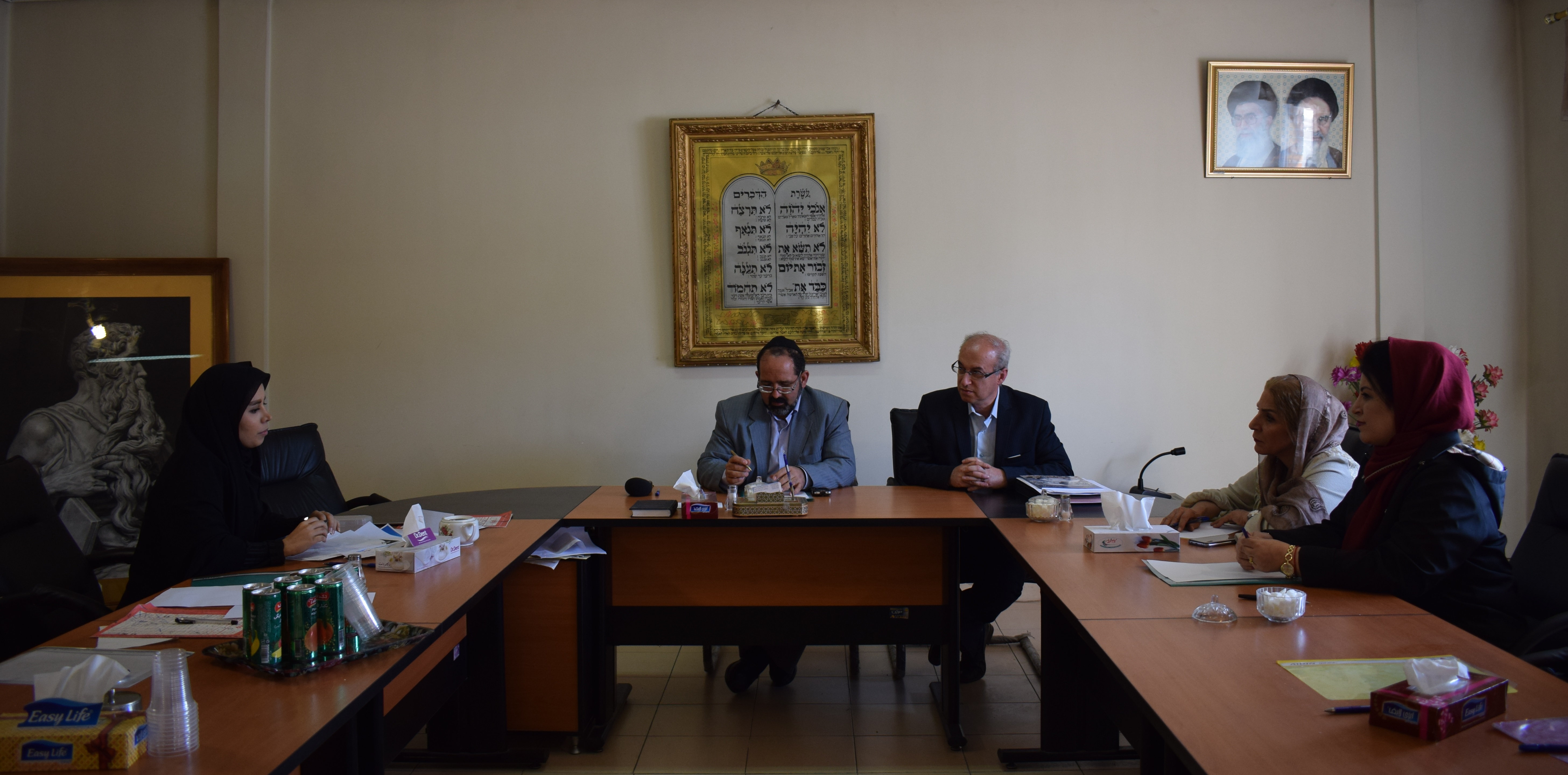A group of women activists, the Institute for the Protection of Women’s Rights attended on March 17, 2018 at the Tehran Jewish Association located in the region of the Republic, and with the chairman of the Jewish Association of Tehran Mr. Dr. Homayoun Same Yeh Najaf Abadi, Religious Reference and Rabbi Mr. Dr. Hamami, Internal Medicine, Iraqi Frank, Editor-in-Chief of Ofoghe Bina and member of the Jewish Women organization and Ms. Levian board member of the Women’s Organization they discussed in the Jewish Association which is as follows.
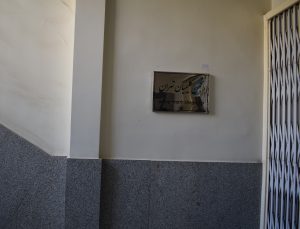
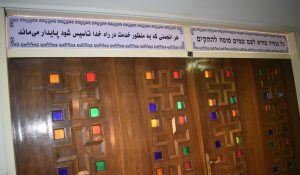

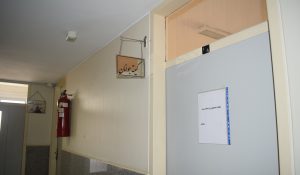
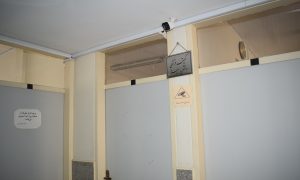

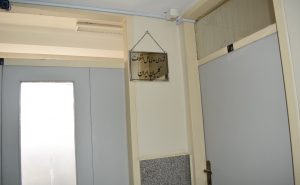
Dr. Same Yeh said about the background and activities of the association: The Jewish Association is the sixth association that has received permission from the Ministry of the Interior and one of the oldest formations in Iran. Before the association is registered also have activity background with various names. About 200 years ago in Tehran, that the Jewish population chose a place for life the elders of the community gathered together, and each one was responsible for doing something in society and tried to solve the problems of the Jewish community within themselves and this problem did not go out, for example, they resolved family and financial disputes and they called them ‘Abra’ meaning groups and associations at that time, their judgment had come into force. After that, the Society of Jewish people was registered before the revolution. After several years of revolution, the association did not have activities and since the year 1363, the association has begun work powerful. According to its charter, the duty of the Association of the Churches is related to cultural, religious and charitable issues, as well as to the principles of food and social activities of the Jewish community. The Jewish Association is the trustee of the Jewish community in Tehran, as well as the mother of the Jewish community in other cities. It not only supports the Jewish community of Tehran, but also essentially protects the entire Iranian Jewish community, and if there is a problem for the Jewish community in the cities, the Jewish Association of Tehran will be responsible for solving the problems of the cities. The Jewish Association in Tehran has many organizations such as Youth Organization, 3 Jewish Youth Houses, Student Organization, Seniors’ House, Synagogue, and 5 Governmental and Non-Governmental Girls’ Boys’ Schools and the responsibility for all of these subset is with the Tehran Jewish Association. In addition, in the Judaism Society of Tehran, several other organizations, including the Jewish Women and Jewish ladies, Cultural Center of the Iranian Jewish community, there is a hospital doctor Sapir that Each of them has separate charter and separate organizations that are not a subset of the Jewish community but the association always supports them and works closely with them.
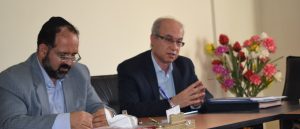
Dr. Hamami stated about the number of Jewish worship houses and synagogues in Iran: Jews have a lot of historical history in Iran and they were present before the formation of Iran during the years of Mad and Pars. Also, throughout history, Judaism, Iran, and the official religion of the Islamic country have had many intellectual and cultural similarities and this has caused Jews to be associated with the Iranian nation. In all cities of Iran, there are works of Jewish presence such as cemeteries, synagogues and shrines. Of course, many synagogues that there has been a lack of population and migration is empty and unused. There are also 23 active synagogues in Tehran, the old Jewish neighborhood in Tehran Located in the area of the Syros crossroad or Udallajan and the synagogue of Yusef Abad and Vali Asr. Also, recognized minorities within the constitutional framework have no limits in performing religious ceremonies and festivals and personalities, and are free. At present, the synagogues have not risen and remain as usual. Dr. Hamami also said about performing religious ceremonies: There is no problem in performing private ceremonies in the synagogues. The ceremony is done freely and there is no limit to this. The police have great cooperation to hold some of the programs to do this ceremony well. In connection with the closure, the Jewish special schools are allowed to close on Saturdays, which are our special day’s festivals and programs and education has been a good partner in the field. It also allows the exi of students during religious hours and the holding of distinct religious classes using special books of minorities and there are no restrictions in this regard and is pursuing a Jewish representative in the Iranian Parliament we are to fix the difficulty of registering Hebrew language scores in students’ record and also the problem of Saturday’s closure in the recent government has been resolved.
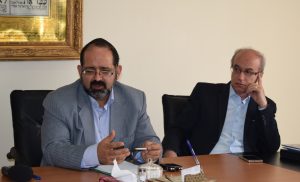
Dr. Same Yeh, in answer to the question of assessing legal capacity in Iran for political-social activities, in particular freedom of speech and media, for the Jews, stated: The Association of Churches is responsible for the pursuit of social and non-political affairs and political issues are being pursued through a Jewish representative in the paramilitaries. Recently the state of political and social activities is improving. We can also freely express our ideas and opinions and raise our demands with the authorities.
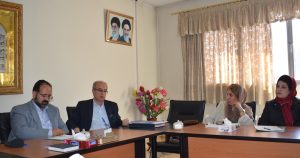
Also Dr. Same Yah concerning communication with government centers added: Jewish Association has more relationship with the Ministry of Interior in that way, we raise issues and problems and this center pay attention to our requests, Ministry of Culture and Islamic Guidance, President’s Advisor in the affairs of minorities and ethnic groups, Police Force is one of the organizations that always has a very close cooperation with us in performing ceremonies and maintaining security and they respect our religion regarding the freedom to perform such ceremonies as hijab, the mixing of women and men, and all the conditions that exist in our law and these conditions are also for other minorities. He quoted from the Assyrian representative said: For example, during the interruption of Christmas with the decades of mourning Muharram, Police Force, allows us to perform ceremonies with full security. We also have wide and two-way interaction with education in order to pursue demands. Education also has many efforts to maintain our schools despite the low population of our students on the other hand, we also lease our schools with little cost to Education which, in return, Education provides us some benefits. Dr. Same Yeh said about the situation of Jews in Iran compared to other countries: Some community issues are specific to the Jewish law that there are two challenges for minorities in the law: One is a retaliation law that if a Muslim injures non-Muslims, it will not be reprimanded another challenge is the issue of inheritance If a child or spouse become Muslim the entire inheritance only reaches that
person which has caused abuse in the community of religious minorities.
Of course, the Jewish minority community has freedom to perform religious practices and handle this with full security, whereas, in the Europe countries, there is a security officer due to insecurity, in front of the whole of worship but there is not even a security camera in our worships in Iran and these people are doing their religious duties in comfort and what is important for us is that religious minorities in Iran is well accepted that it is improving day by day. Also, the public is well behaved with the Jewish community. There is a grumble of voice and sound organization, that we at the ceremony of 22 Bahman, Fajr Decade, the holy ceremony of Imam Khomeini and many ceremonies that we participate in respect for the Iranian community and support the Islamic Republic but the voice and sound organization have no desire to reflect it and we’re complaining about this issue. Also, many programs that aim to oppose to Zionism is to insult Judaism and in the pursuit of officials, such issues have only been resolved by the Supreme Leader. Dr. Hamami also added: The Jewish community has been beside people on all scenes. In the Islamic Revolution, we had a martyr in the imposed war. The interaction of the Jewish community with the Iranian people has increased the awareness of the people about them. Monotheistic religions all order good morals and good behavior, and this is the common point of these religions. The view in Judaism in high-ranking officials (Supreme Leader) is positive. Also, the opinion of Imam and the supreme leader who emphasized that Jewish discussion is separate from Zionism. Iraqi in an answer to the views of the Jewish religion to the women, said: congratulations for Women’s Day and the birthday of Hazrat Fatima (SA) said women are in the process of developing career and education, which includes Jewish women. Of course, there are some limitations in the Shari’a laws for Jewish women which requires effort and follow up to eliminate them through the rabbis.
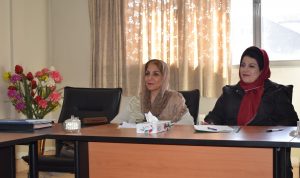
Ms. Levine added about the status of women in the Jewish religion: In our religion on marriage, there are many limitations relative to the authority of Muslim women, Jewish women has no right to divorce their problems must only be tolerated and unfortunately, in this religion there is no special place for women. We hope this situation will improve. One of the goals of women’s organization is to support women.
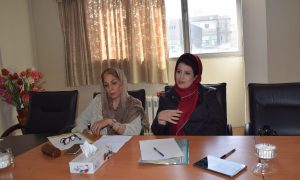
Dr. Same Yeh in this regard added: In the Jewish religion, all the expenses of women are with men and the man must provide a living in the dignity of a woman while living in a father’s house and also the place of residence of a woman should be a near the synagogue and a temple to perform religious duties. Also on the topic of divorce seizure of male property if there is no reconciliation in life.
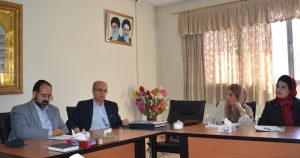
In the end, Dr. Hamami, the religious authority, offered better education and awareness on minorities in universities and educational centers and Dr. Same Yeh also has paid attention on promoting humanitarian perspective in society.



